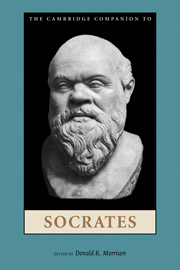Book contents
- Frontmatter
- 1 The Rise and Fall of the Socratic Problem
- 2 The Students of Socrates
- 3 Xenophon and the Enviable Life of Socrates
- 4 Socrates in Aristophanes’ Clouds
- 5 Socrates and the New Learning
- 6 Socratic Religion
- 7 Socrates and Democratic Athens
- 8 Socratic Method
- 9 Self-Examination
- 10 Socratic Ignorance
- 11 Reconsidering Socratic Irony
- 12 Socratic Ethics and the Socratic Psychology of Action
- 13 Socrates and Eudaimonia
- 14 Socrates’ Political Philosophy
- 15 Socrates in Later Greek Philosophy
- Socrates Bibliography
- Index of Names and Subjects
- Index of Passages
12 - Socratic Ethics and the Socratic Psychology of Action
Published online by Cambridge University Press: 28 March 2011
- Frontmatter
- 1 The Rise and Fall of the Socratic Problem
- 2 The Students of Socrates
- 3 Xenophon and the Enviable Life of Socrates
- 4 Socrates in Aristophanes’ Clouds
- 5 Socrates and the New Learning
- 6 Socratic Religion
- 7 Socrates and Democratic Athens
- 8 Socratic Method
- 9 Self-Examination
- 10 Socratic Ignorance
- 11 Reconsidering Socratic Irony
- 12 Socratic Ethics and the Socratic Psychology of Action
- 13 Socrates and Eudaimonia
- 14 Socrates’ Political Philosophy
- 15 Socrates in Later Greek Philosophy
- Socrates Bibliography
- Index of Names and Subjects
- Index of Passages
Summary
In deciding what to do, people often work with a distinction between what is good as a means (to something else) and what is good as an end. If one does x for the sake of y, then one is taking x to be good as a means and y to be good as an end. Some ends – “intermediate ends” – are themselves means to further ends. But if we are to avoid an infinite succession of means to ends – since that would never allow us to act at all – some ends will have to be final ends: single good things for the sake of which everything else in the relevant teleological (means/end) progression is ultimately desired. All three of Socrates, Plato, and Aristotle take this ball and run with it. They believe not only that every deliberate action is generated by a desire for a single final end, but, more strongly, that, for humans, this final end is the same in every case: happiness.
True, Plato and Aristotle depart from Socrates in believing that there are some motivated actions which are not deliberate actions. Both believe there are such things as “akratic” actions, generated by irrational desires (for food, drink, sex, and the like). Both suppose that these irrational desires sometimes overwhelm (out-muscle) the deliberate desire for good which would otherwise have produced a quite different action. But not Socrates. Socrates holds that all motivated actions whatever are deliberate actions – that is, actions generated by the desire for a final good or end, happiness, which lies at the top of a means/end structure running all the way down to the actual action done.
- Type
- Chapter
- Information
- The Cambridge Companion to Socrates , pp. 260 - 292Publisher: Cambridge University PressPrint publication year: 2010
- 3
- Cited by

